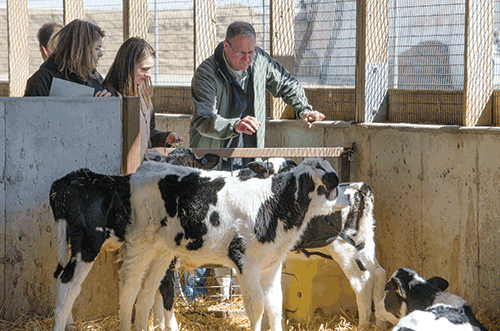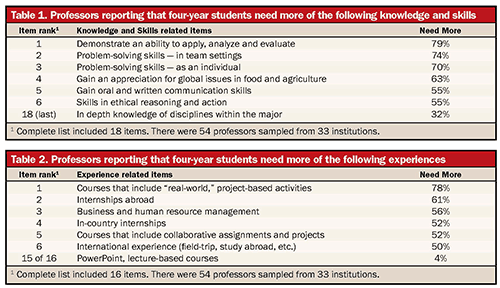
There was a time not long ago when the major concerns of most dairy farmers were essentially to ensure cows and young stock were well cared for and well-fed, properly milked and inseminated on time and equipment was working properly. Unfortunately, those days are long gone. Price volatility, environmental concerns, immigration and consumers' misconceptions are some of the forces that are reshaping the industry. These transformations raise questions on how to best prepare our future owners, managers and leaders.
A few statistics
In the past few decades, colleges and universities offering a specific bachelor degree in dairy science have dwindled nationwide. As this has taken place, some institutions now offer animal science degrees with a dairy emphasis. Despite these shifts, according to a 2006 article in the Journal of Dairy Science, the population of students in dairy science programs has remained relatively constant and totaled roughly 1,200 in 2004.
As is the case across many agricultural disciplines, student demographics also have changed dramatically. Women are now a majority. In addition, current trends indicate it is only a matter of a few years before students with no dairy, no farm and no agricultural background will outnumber their traditional counterparts.
Dairy science programs have not been static. They have changed in response to the emerging needs of not only producers and employers but also the wants of the student population and the concerns of society. Dairy science programs have never been built for a single career path but rather have been modified or "modernized" over the years in order to prepare students for a wide range of distinct professional careers.
A typical bachelor's in dairy science requires 120 credits or roughly 1,500 hours of in-class course work with an expected one to three hours of out-of-class homework for every hour in class. Although it may sound like a lot, it is far short of the approximately 10,000 hours needed by anyone who desires to become an expert in what they love to do, be it playing music or basketball.
The challenge of designing a four-year (eight semester) program to help prepare students for diverse future careers is mind-boggling. Many employers today take it for granted that a dairy science graduate has gained the latest knowledge in core discipline areas of nutrition, genetics, management and milk quality.
However, what draws the attention of a recruiter when reading résumés more and more is the set of experiences and transferable skills that demonstrate the job seeker as an excellent communicator, problem-solver, creative thinker, team-worker and life-long learner. Everything else being equal, they will prefer the candidate with a demonstrated sense of personal responsibility through integrity, reliability and diligence, as well as social responsibility such as respect for diverse views.
In order to learn more about the views of animal and dairy science professors on knowledge, skills and experiences to be emphasized in order to better prepare our students for a 21st century career, we conducted a survey of 54 professors from more than 33 institutions. This entire audience attended a national conference that was held in Madison, Wis., earlier this year.

What knowledge and skills do students need in the future? Table 1 shows the percentage of professors (54 sampled) who reported that students in their institutions needed more of certain knowledge and skills. Except for the item ranked fourth, "gaining an appreciation for global issues in food and agriculture," five of the top six items in Table 1 match closely with what employers would typically look for in a job candidate.
Most professors believed that current courses in the core curriculum provide sound knowledge, and less than a third believed that students needed more in-depth knowledge of disciplines within the major. Clearly, today's professors recognize that their students must do more than demonstrate an ability to remember, understand and explain course content.
Meanwhile, Table 2 shows the experiences that professors believe their students should have a greater opportunity to engage in during college. The majority of professors believed that courses should include much more of real-world, project-based activities and collaborative assignments. However, there is no additional need for PowerPoint-based lectures. Other experiences that ranked high included: internships (abroad and domestic), business and human resource management, and international experiences.
A vision for the future
The challenge for the future is to add value to a four-year program without adding a litany of new courses or costs. High-impact practices (HIPs) are courses and experiences that allow students to demonstrate gains in transferable skills and other attributes employers desire in employees.
In the freshmen year, these practices (freshmen seminars and residential learning communities) are desirable because they help students to make greater academic gains and reduce the risk of dropping out of college. In later years, high-impact practices include undergraduate research, internships, intensive writing courses, capstone courses and international experiences.
Going to college has - and will continue to - become less about taking a series of courses and more about taking responsibility for one's own education and developing certain habits of the mind. Professors with a passion for teaching know that a university education is not only a means to transform peoples' lives, but also a means to provide the dairy industry with the next generation of talented innovators and leaders.
This article appears on page 275 of the April 25, 2013 issue of Hoard's Dairyman.






